April 2014
| See more photos of the Hall of Fame celebration on our Facebook page |
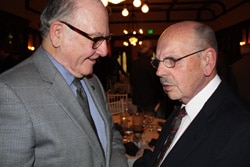 |
| Above: Pat Williams & John Board chat after the Hall of Fame banquet. |
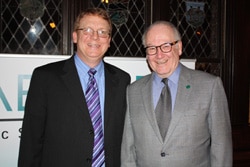 |
| Erik Burke & Pat Williams: great friends & sons of Butte Irish mothers. |
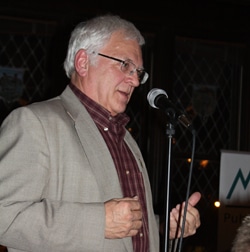 |
| Jerry Rukavina introduces John Board. |
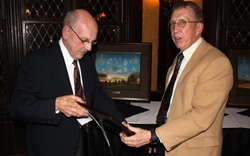 |
| John Board accepts his award from Eric Feaver. |
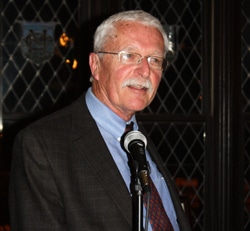 |
| Dick Barrett talks about the late Jim McGarvey. |
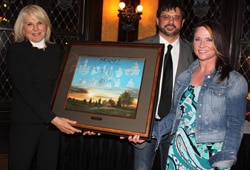 |
| Jim McGarvey’s wife Suzanne, son Tim, and daughter Seana accept Jim’s awards. |
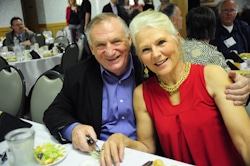 |
| The late Jim McGarvey & wife Suzanne. |
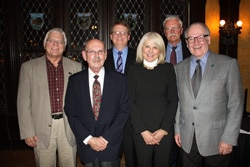 |
| Back: Jerry Rukavina, Erik Burke, & Dick Barrett. Front: John Board, Suzanne McGarvey, Pat Williams. |
MEA-MFT Hall of Fame Inaugurated
MEA-MFT recently created a Hall of Fame to celebrate our heroes – the trailblazers whose work and dedication have made our union the stronghold of hope that it is today.
The first three heroes to be inducted into the MEA-MFT Hall of Fame have all been titans in MEA-MFT’s history and Montana’s progressive movement. They are:
Pat Williams, former Montana teacher, former Montana U.S. Congressman, and a 50-year member of MEA-MFT.
John Board, former president of the Montana Education Association (one of the two unions that formed MEA-MFT).
The late Jim McGarvey, former president of the Montana Federation of Teachers (the other union that formed MEA-MFT); vice president of MEA-MFT, and executive director of the Montana State AFL-CIO.
The three were honored during a celebration at the Montana Club in Helena March 27, on the eve of MEA-MFT’s 2014 Representative Assembly. Dozens of MEA-MFT members and friends attended the event. Here are some highlights:
Pat Williams: “Living proof that elections matter, values matter, communities matter, unions matter, leadership matters.”
Introducing Pat Williams, MEA-MFT Executive Director Erik Burke said he can’t remember a time when he didn’t know the name Pat Williams. He and Williams both are sons of Butte Irish mothers, he said, and Williams was always considered part of Burke’s family.
“First and foremost, Pat was and is an educator,” Burke said. “His entire career has been about promoting and supporting public education.” Williams began his career as a teacher in Butte, and he retired from the University of Montana as an educator.
In between, Williams served nine terms in the U.S. Congress, where he fought tirelessly for education. “Be it Head Start, kindergarten funding, investing in small class sizes, or access to affordable higher education, Pat made education a priority in Congress from 1978 until he retired in 1996,” said Burke. “He was repeatedly recognized by both NEA and AFT as a champion for public education.”
As a Butte native who witnessed the devastating impact of mine closures on that town, Williams knew education was the only path to economic vitality. So he worked to create adult education programs, job training, union apprenticeships, and worker retraining – helping Montanans and hundreds of thousands of other Americans support their families and live the American dream.
Williams also sponsored landmark legislation like the Family and Medical Leave Act, which has helped countless families in times of crisis. He co-sponsored the National Service Bill that helped establish AmeriCorps, “a program that has tutored kids, improved public trails and forest access, clothed and sheltered the homeless, provided free vision services to low-income Montanans, and insulated homes for Montana’s last and least,” Burke said.
Williams was a major force in passing the Goals 2000 Educate America Act in 1993, a bill Burke characterized as “more carrot, less stick; more investment in classrooms, less investment in testing companies.”
“Pat Williams stands as living proof that elections matter,” Burke said. “Values matter. Communities matter. Unions matter. Leadership matters. And remembering who you are, and who helped you achieve — it matters!”
“This is a real highlight for me,” Williams told the crowd at the celebration. “I’m in your union too; I’m a member just like you. It’s 50 years right now that I joined this union. During my campaigns, when you can really show what you’re for, no flag flew higher than the MEA-MFT, AFL-CIO. This union and its 18,000 members has been one of the prides of my life.”
In state after state, Williams said, “it’s the teachers’ union that’s the single force for progress.” But when it comes to political action, he said, “too many teachers drop out. They don’t put the signs in their yards and go door to door. If there’s a single lesson today, it’s to open your eyes and get involved.”
Even in these difficult times for labor, Williams said, MEA-MFT has grown and been a force for progress in Montana.
“I can tell you that this union ranks high in this country,” he said. MEA-MFT has helped make Montana “a progressive beacon in the Rocky Mountain West. When you want to know your direction in the worst fog, you can look around and see this beacon blinking off and on.”
John Board: “On the shoulders of giants”
“I’ve been waiting for this occasion for over 50 years,” said MEA-MFT Field Consultant Jerry Rukavina, introducing John Board at the celebration, “ever since I walked into class at East Junior High in Great Falls and there was John Board. He was my 7th grade English teacher.”
Board began teaching in Great Falls in 1959. He served as president of the Great Falls Education Association from 1973 to 1975.
“People don’t understand how ugly it really was in those days,” Rukavina said. “Administrators had declared themselves the enemy. This was back in the battleground era where every attempt to be professional, unionized, or an advocate of any sort for public schools and teachers was met with arrogant opposition and retaliation. John broke plenty of ground for GFEA members and for all of us.”
Board served as president of the Montana Education Association from 1976 to 1984. In 1980, he became MEA’s first full time president.
“In those early days of teachers’ collective bargaining, John stood up, spoke up, and never backed down,” Rukavina said. “His advocacy and leadership cost him jobs in Great Falls and Montana.”
At a time when teachers thought politics were beneath them, Board started MEA-MFT’s political program, knowing that teachers had to get involved or get steamrolled.
Board later worked for the Connecticut Education Association. Back in Montana, he became an Episcopal deacon in 2005 and served as the interim executive director of the Montana Association of Churches in 2008.
“We stand on the shoulders of giants,” Rukavina concluded. “No MEA-MFT Hall of Fame would be complete without the addition of our advocate, our trail-blazer, our friend, and my broad-shouldered junior high English teacher, John Board.”
John Board began his remarks by saying, to the cheers of the crowd, “If I were president, Pat Williams would be secretary of education, not Arne Duncan; and our public schools, students, and teachers would be much better off.”
Board offered a snapshot of what life was like for teachers in Montana when he started teaching: Back then, teachers had to sign a loyalty oath in order to be hired. The Great Falls school system required job applicants to declare their religion. Catholics had little chance of getting hired. Teachers who got pregnant lost their jobs after three months and had little chance of getting re-hired.
“Things started to change in the late 1960s and 1970s,” Board said. “Teachers began to demand a voice in determining their salaries, benefits, and working conditions. But nothing was gained without a struggle.”
Board said that MEA-MFT members now have almost everything members didn’t have when he began teaching. “But the struggle continues, and it always will,” he said. “You are now in danger of losing everything that has been gained. Just look at what has happened to public employees in Michigan, Ohio, Indiana, and Wisconsin.”
The forces against public schools “have never stopped their dirty work,” going back to 1836, when Horace Mann succeeded in establishing public schools in Massachusetts despite opposition, he said.
“Among these forces are corporations, wealthy individuals, and their minions,” he said. “Why are they against public education and teacher unions? For very simple reasons: greed and their belief that some peoples’ children count and others don’t.”
As contemporary examples, Board pointed to Bozeman millionaire Greg Gianforte, who promotes using public dollars for private religious schools; Gianforte’s “sidekick” Steve Daines, Montana’s current congressmen; and Montana legislatives who voted for charter schools and tuition tax credits. “They belong in a Hall of Shame,” Board said. “You have your work cut out for you.”
Board concluded with the words of Rabbi Hillel (30 BC-9 AD) — “If I am not for myself, who will be for me? If I am not for others, what am I? And if not now, when?”
Jim McGarvey: “Organizing encoded in his DNA”
Calling Jim McGarvey a “great personal friend, mentor, and a wonderful and indefatigable political tactician,” Dick Barrett presented McGarvey’s family with his Hall of Fame honor.
Barrett, a retired economics professor at the University of Montana, state senator, and long-time leader in the Montana Federation of Teachers and MEA-MFT, said, “Everything I know about unions — how to organize them, how to manage and strengthen them, how to negotiate, how to lobby, how to develop political alliances — I learned from Jim. And Montana is filled with people like me whom Jim mentored.”
McGarvey built the Montana Federation of Teachers from scratch beginning in 1972 and led it for 28 years. He was a chief architect of the 2000 merger of MEA and MFT. He later served as president and then executive director of the Montana State AFL-CIO.
Throughout his career, “Jim was always out there somewhere, organizing, finding new members, recruiting and training new leaders, building a bigger and stronger union,” Barrett said. “He was born with the phrase ‘the organized organize the unorganized’ encoded in his DNA.”
McGarvey’s other key principal was that you can always negotiate, Barrett said. He was always willing to talk to the “other side,” trying to find common ground.
“Whatever Jim did for the union, he put his heart and soul and all his energy into,” Barrett said. “And all his waking hours. And given that his waking hours could be just about anything, a lot of the phone calls that he made to mentor or cajole or commiserate with local leaders occurred at awful times of the day or, especially, the night. Spouses of the local leaders, or at least one I know pretty well, more than once pulled the pillow over their heads and moaned, ‘Oh Jesus, it’s McGarvey again.’ But the local leaders were usually grateful for the call.”
For McGarvey, the union always came first, Barrett said. Case in point: when MEA and MFT merged, and “the delicate subject of who would serve as president of the new organization inevitably arose,” McGarvey took a backseat as vice president. “Jim, and Eric too, were putting the best interests of the union first,” Barrett said.
“That was the way Jim lived his whole life, and it’s why we are welcoming him into the MEA-MFT Hall of Fame tonight,’ Barrett said.
McGarvey’s wife, Suzanne, and his children, Tim McGarvey and Seana Iverson, accepted the award on behalf of Jim.
